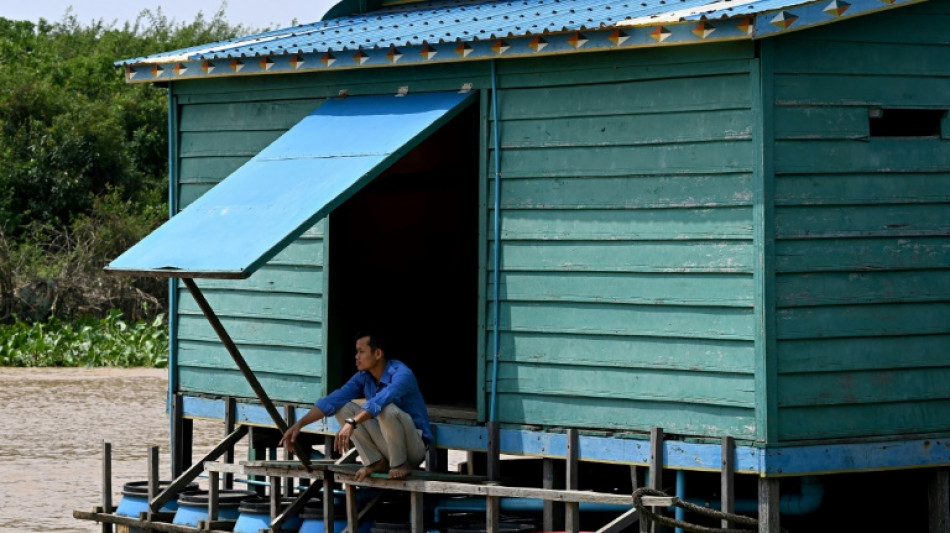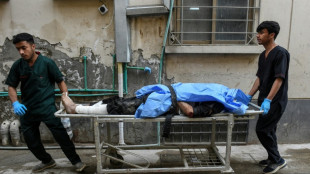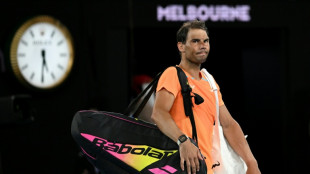
-
 Ten security officials, 37 militants killed in SW Pakistan attacks: official
Ten security officials, 37 militants killed in SW Pakistan attacks: official
-
Epstein survivors say abusers 'remain hidden' after latest files release

-
 'Full respect' for Djokovic but Nadal tips Alcaraz for Melbourne title
'Full respect' for Djokovic but Nadal tips Alcaraz for Melbourne title
-
Wollaston goes back-to-back in the Cadel Evans road race

-
 Women in ties return as feminism faces pushback
Women in ties return as feminism faces pushback
-
Ship ahoy! Prague's homeless find safe haven on river boat

-
 Britain's Starmer ends China trip aimed at reset despite Trump warning
Britain's Starmer ends China trip aimed at reset despite Trump warning
-
Carlos Alcaraz: rare tennis talent with shades of Federer

-
 Novak Djokovic: divisive tennis great on brink of history
Novak Djokovic: divisive tennis great on brink of history
-
History beckons for Djokovic and Alcaraz in Australian Open final

-
 Harrison, Skupski win Australian Open men's doubles title
Harrison, Skupski win Australian Open men's doubles title
-
Epstein offered ex-prince Andrew meeting with Russian woman: files

-
 Jokic scores 31 to propel Nuggets over Clippers in injury return
Jokic scores 31 to propel Nuggets over Clippers in injury return
-
Montreal studio rises from dark basement office to 'Stranger Things'

-
 US government shuts down but quick resolution expected
US government shuts down but quick resolution expected
-
Mertens and Zhang win Australian Open women's doubles title

-
 Venezuelan interim president announces mass amnesty push
Venezuelan interim president announces mass amnesty push
-
China factory activity loses steam in January

-
 Melania Trump's atypical, divisive doc opens in theatres
Melania Trump's atypical, divisive doc opens in theatres
-
Bad Bunny set for historic one-two punch at Grammys, Super Bowl

-
 Five things to watch for on Grammys night Sunday
Five things to watch for on Grammys night Sunday
-
Venezuelan interim president proposes mass amnesty law

-
 Rose stretches lead at Torrey Pines as Koepka makes cut
Rose stretches lead at Torrey Pines as Koepka makes cut
-
Online foes Trump, Petro set for White House face-to-face

-
 Seattle Seahawks deny plans for post-Super Bowl sale
Seattle Seahawks deny plans for post-Super Bowl sale
-
US Senate passes deal expected to shorten shutdown

-
 'Misrepresent reality': AI-altered shooting image surfaces in US Senate
'Misrepresent reality': AI-altered shooting image surfaces in US Senate
-
Thousands rally in Minneapolis as immigration anger boils

-
 US judge blocks death penalty for alleged health CEO killer Mangione
US judge blocks death penalty for alleged health CEO killer Mangione
-
Lens win to reclaim top spot in Ligue 1 from PSG

-
 Gold, silver prices tumble as investors soothed by Trump Fed pick
Gold, silver prices tumble as investors soothed by Trump Fed pick
-
Ko, Woad share lead at LPGA season opener

-
 US Senate votes on funding deal - but shutdown still imminent
US Senate votes on funding deal - but shutdown still imminent
-
US charges prominent journalist after Minneapolis protest coverage

-
 Trump expects Iran to seek deal to avoid US strikes
Trump expects Iran to seek deal to avoid US strikes
-
Guterres warns UN risks 'imminent financial collapse'

-
 NASA delays Moon mission over frigid weather
NASA delays Moon mission over frigid weather
-
First competitors settle into Milan's Olympic village

-
 Fela Kuti: first African to get Grammys Lifetime Achievement Award
Fela Kuti: first African to get Grammys Lifetime Achievement Award
-
'Schitt's Creek' star Catherine O'Hara dead at 71

-
 Curran hat-trick seals 11 run DLS win for England over Sri Lanka
Curran hat-trick seals 11 run DLS win for England over Sri Lanka
-
Cubans queue for fuel as Trump issues energy ultimatum

-
 France rescues over 6,000 UK-bound Channel migrants in 2025
France rescues over 6,000 UK-bound Channel migrants in 2025
-
Surprise appointment Riera named Frankfurt coach

-
 Maersk to take over Panama Canal port operations from HK firm
Maersk to take over Panama Canal port operations from HK firm
-
US arrests prominent journalist after Minneapolis protest coverage

-
 Analysts say Kevin Warsh a safe choice for US Fed chair
Analysts say Kevin Warsh a safe choice for US Fed chair
-
Trump predicts Iran will seek deal to avoid US strikes

-
 US oil giants say it's early days on potential Venezuela boom
US oil giants say it's early days on potential Venezuela boom
-
Fela Kuti to be first African to get Grammys Lifetime Achievement Award


'Floating toilets' help Cambodia's lake-dwelling poor
Pointing to the murky waters of the Tonle Sap, Si Vorn fights back tears as she recalls her four-year-old daughter dying from diarrhoea after playing in the polluted lake.
Her family of 12 is among 100,000 people living in floating houses on Cambodia's vast inland waterway, and while their village has 70 houses and a primary school, it has no sanitation system.
Now a local social enterprise, Wetlands Work (WW), is trying to tackle the problem by rolling out "floating toilets" to filter waste, but the high cost of installation means for now they are available to only a lucky few.
For generations, villagers whose livelihood depends on fishing have defecated directly into the water that they use for cooking, washing and bathing -- risking diarrhoea and even more severe water-borne diseases such as cholera.
"We use this water, we drink this water, and we defecate into this water. Everything!" Si Vorn, 52, told AFP, saying her family fell ill all the time.
"Every day, I worry about my health. Look at the water, there is no sanitation. I'm so worried but I don't know what to do."
- Microbe magic -
More than a million people live on or around Tonle Sap, the world's largest inland fishery, but there is no system in place for managing human waste from the 20,000 floating houses around the lake.
Cambodia, ravaged by war and the genocidal Khmer Rouge in the 1970s, is one of the poorest countries in Southeast Asia.
Around a third of the population does not have access to proper toilets, according to the WaterAid charity, and diarrhoea is a leading killer of children under five.
Wetlands Work hopes its HandyPods, as the floating toilets are properly known, can help Si Vorn's village and others like it in other countries.
HandyPods use three small tanks to filter and clean the sewage.
Human waste passes from the toilet into the first tank, then the second and third. Inside, trillions of microbes in a "biofilm" -- a slimy matrix of microorganisms -- remove pathogens and the treated water is discharged into the lake.
"We're addressing sanitation in floating villages that have never experienced sanitation before," Taber Hand, the founder of Wetlands Work, told AFP.
The resulting "grey water" may not be clean enough to drink, but it is safe to use for washing and cooking.
The company has installed 19 floating toilets in Chong Prolay, Si Vorn's village, and they have proved popular with the few that have them.
"We use this water because a bottle of clean water is 4,000 riel ($1), so we can't afford to buy clean water for using, cooking and bathing," fisherman Roeun Nov, who won a free HandyPod through a lucky draw two months ago, told AFP.
"We buy clean water for just drinking."
- Cost a barrier -
WW has installed more than 100 HandyPods in 20 villages on the lake through two separate projects funded by European Union, and aims to roll out 200 more by 2025.
The hope is that the more villagers see the toilets in action, the more they will want proper sanitation.
Outside Cambodia, WW has also installed the system in 12 villages in Myanmar, but cost is a major obstacle to widespread adoption.
The floating toilets cost around $175 each -- a huge sum of money for Tonle Sap fishing communities, where on a good day a villager might make $5.
Hand said his team was considering subsidies in the longer term, so that families would only pay $35 to $40 for a treatment system.
Chan Sopheary, a WW field officer, said lake people were beginning to change their behaviour around sanitation and hygiene, but they were not willing to pay for the toilet yet given their poor livelihoods.
"We cannot afford one because we just make enough money for daily spending," Si Vorn's husband Yoeun Sal told AFP after bathing in water by his house during a hot afternoon.
"If no one helps us, we will keep using the lake (as a toilet)," he added.
G.Schulte--BTB



